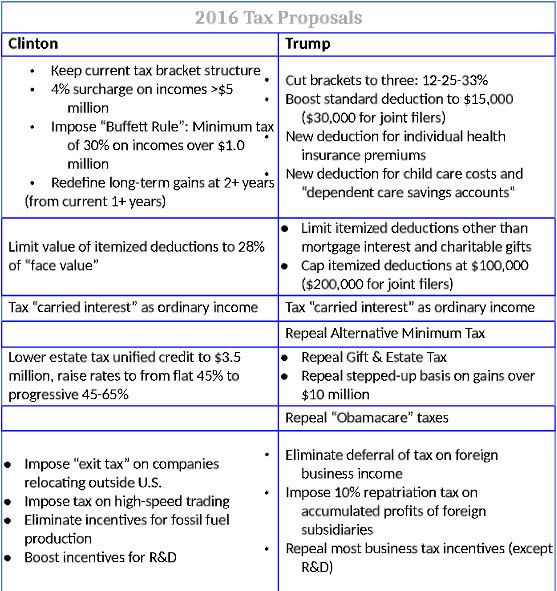|
By now many of you have heard about the GameStop/Robinhood stock market news floating around social media sites like Reddit and TV lately. If not, instead of going on and on about short positions and mark-to-market. Here's a quick video that explains it all:
If that video is as clear as mud, or has you thinking you need to go trim your hedges outside, then let's add another wrinkle. What happens when the taxman comes knocking after you have sold your GameStop stock for a gain?
Stocks sold for a gain (buy low, sell high) are called capital gains income and is taxable. Stocks held for less than a year have short-term capital gains and stocks held for a year or long have long-term capital gains. Short-term capital gains are taxed at the ordinary rate which is typically higher than the long term rate. Short-term gains will be included with your other ordinary income (W-2, 1099, etc) and you will pay tax based on your marginal tax rate and income. The key to lowering your tax with stock sales is to create a strategy that will enable you to pay lower taxes on capital gains. Some strategies include:
It it also important to note that with the change in the Presidential Administration, your stock tax plans will need to be devised in concert with your other personal and business tax situation(s). Feel free to contact us if you need assistance with your stock tax strategies, small business tax, or tax planning. If you need new hedges, I may know a good landscaper.
0 Comments
Itemized deductions versus the standard deduction
The TCJA doubles the standard deduction, but suspends the personal exemptions and virtually eliminates many of the itemized deductions. The law temporarily eliminates miscellaneous itemized deductions subject to the 2 percent floor and limits the home mortgage interest deduction to home acquisition debt of up to $750,000. With these changes, some taxpayers may see a lower taxes. Some taxpayers that itemized in the past may not for 2018. Contact us is you need to run the numbers for your tax situation. If the results are grim, you may need to adjust your employer withholding (Form W-4) and/or quarterly estimated tax payments. Bunch charitable contributions The TCJA temporarily increases the limit of cash contributions to public charities from 50 to 60 percent of adjusted gross income (AGI). The only problem (as mentioned above) is that the double standard deduction and itemized changes will leave many taxpayers left out. One solution is to bunch or increase charitable contributions in alternating years, or set up donor-advised funds. Watch out for home equity debt interest The TCJA allows for home equity debt interest if the funds were used to buy or substantially improve the home that secures the loan. Taxpayers must keep good records to ensure that the proceeds were used in this manner, payment to credit card or other personal debt is not allowed (even if prior to 2018). Revisit 529 qualified tuition plans The TCJA revises earnings in a 529 college savings plan and allows for paying tuition at an elementary or secondary public, private or religious school, up to $10,000 per year. If you fall in this boat, it may be time to revisit their 529 plans. Maximize the qualified business income deduction And of course last but not least the QBI deduction (from our last post) for small business owners. Be sure to contact us for steps how this deduction can save your hard earned dollars The Labor Day festivities are behind us, this means that the holiday season is quickly approaching (I can hear Andy Williams' "It's the Most Wonderful Time of the Year" music fading in). If you are a small business owner who hates writing that check to the IRS, this year's tax planning season could be merrier than ever due to the changes brought about with the Tax Cuts and Jobs Act (TCJA). This is the time for ALL small business owners and entrepreneurs to start doing true tax planning. The TCJA is virtually a once in a lifetime opportunity for smart small businesses to use tax planning in a way that will ensure they don't lose their hard earned dollars. One key area that we have focused on is the Section 199A Qualified Business Income (QBI) rules, paying close attention to the recent developments from the IRS. There has not been this much change in the tax code since 1986 and it is important for small business owners and entrepreneurs to make the most of this opportunity to save money. One way to save money is to know how to navigate the new Section 199A Qualified Business Income (QBI) rules and we have completed our presentation for small businesses and entrepreneurs. Qualified Business Income is a "new" kind of income that is recognized differently than other types (ordinary, investment, passive) and small businesses need to know how it will affect their bottom line. There is a method to madness behind the change and we take a deeper dive in the presentation. For now check out the video below to get a definition of what QBI is and what income is subject to it. Join us in the coming months on one of our webinar presentations on QBI and other tax planning topics before tax planning season is in the rear-view mirror.  Had another great time meeting the many small business author/entrepreneurs in the local area this past weekend at the Atlanta Professional Business Network (APBN) Authors Showcase. After talking with many of the participants and fellow authors, I have compiled some key takeaways from the event.
 The recently signed Bipartisan Budget Act of 2018 had a few tax extenders that are retroactive to 2017. some of the more notable provisions include: Exclusion for discharge of indebtedness on a principal residence The provision extends the exclusion from gross income of a discharge of qualified principal residence indebtedness through 2017. The provision also modifies the exclusion to apply to qualified principal residence indebtedness that is discharged pursuant to a binding written agreement entered into in 2017. Premiums for mortgage insurance (PMI) deductible as mortgage interest The provision extends the treatment of qualified mortgage insurance premiums as interest for purposes of the mortgage interest deduction through 2017. This deduction phases out ratably for taxpayers with adjusted gross income of $100,000 to $110,000. Above-the-line deduction for qualified tuition and related expenses The provision extends the above-the-line deduction for qualified tuition and related expenses for higher education through 2017. The deduction is capped at $4,000 for an individual whose adjusted gross income (AGI) does not exceed $65,000 ($130,000 for joint filers) or $2,000 for an individual whose AGI does not exceed $80,000 ($160,000 for joint filers). Three-year depreciation for race horses 2-years-old or younger The provision extends the 3-year recovery period for race horses to property placed in service during 2017. Contact us if you have already filed your return and qualify for these tax extender provisions. Happy New Year! With the start of 2018, we have fielded a great deal of questions regarding the Tax Cuts and Jobs Act. We figured we would put out a short post to address the most important ones
1. When will the tax changes take effect? The bill takes effect on January 1, 2018, thus when you file your 2018 taxes (in 2019) you will see the results of the tax changes. W-2 employees will see changes in their paychecks federal withholding in February 2018. 2. How much will the tax changes save a taxpayer? The short answer is, it depends...what your total income is and where your income is derived. Also other factors can play a role in determining how much you will save. 3. Do I need to do anything to change my withholding? According to the IRS regarding withholding changes: “We anticipate issuing the initial withholding guidance in January, and employers and payroll service providers will be encouraged to implement the changes in February,” said the IRS. “The IRS emphasizes this information will be designed to work with the existing Forms W-4 that employees have already filed, and no further action by taxpayers is needed at this time.” These are just a few of the top questions we are hearing from taxpayers, feel free to contact us if you have any questions regarding the Tax Cut and Jobs Act. With just a few days left to go out and vote, here are the tax proposals for the two leading candidates.
 The dog days of summer are in full swing and that typically means spending relaxing hours by the pool with friends and family, not thinking about the stresses of running your business. Before you know it though, those relaxing days by the pool will come to an end and it will be back to business. There are a number of ways you can turn some of that summertime fun into immediate tax savings for your business and family. Here are a few:
These are just a few ways that you can turn your summertime activities into immediate tax savings. Have questions about how; feel free to contact us for time is running out. Just like a sun tanner that stays out in the sun too long, you can get burned if you don't put a tax plan together soon.  If you’re like most small business owners (SBO's), you qualify for all sorts of valuable tax credits and deductions, not to mention additional strategies that could lower your tax bill. But if you (or your tax professional) aren’t looking out for them, you may be losing your share. Now that tax season is over, you should review your tax return for the following: Do I feel that I paid too much tax (or refund was too small)? Did my small business take all the legal credits and deductions this year? What strategies can I use to lower my tax in the future? Many small business owners (SBO's) think that now that tax season is over they can tuck those tax returns away and get back to the more exciting, less stressful tasks in their businesses. Don't put away those tax returns just yet (especially if you feel you paid more tax than you should have). After tax season is a great time to review your tax returns for potential tax savings that you can implement right now. Most SBO's don't realize that every action they take in their business during the year has a real effect on their bottom line. Some of the many deductions and credits a SBO may qualify for include:
These are just a few of the questions SBO's should be asking in the "off" season to ensure that they keep more of their hard earned dollars. Feel free to contact us regarding your assets, health care, or entity selection changes you would like to make before year end. The clock is ticking... |
AuthorVarious contributors Archives
January 2024
Categories
All
|


 RSS Feed
RSS Feed